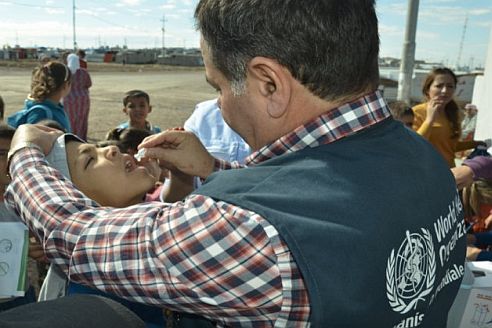
Spreading of a Cholera infection: dozens die in Darfur within a week. How to stop this disease?
Dozens die of cholera in Darfur’s East Jebel Marra within a week
The cholera infection rates are rapidly increasing in East Jebel Marra in South Darfur. Last week, more than 300 new patients were recorded in the locality. Dozens of them died. In Kalma camp, eight people died and more than 200 new cases were reported over the weekend. Parents of students in Kass are calling for a temporary closure of the schools until the cholera epidemic is halted in the area.
“The epidemic is taking its toll among villagers and displaced people in ten densely populated areas in East Jebel Marra,” Hussein Abusharati, the spokesman for the Darfur Displaced and Refugees Association, told Radio Dabanga.
“The situation definitely requires intervention by the World Health Organisation (WHO), and other humanitarian organisations,” he said.
“Since the outbreak of cholera in the locality on August 22, the number of infections reached 316. Dozens of them died.”
Abusharati said that there are no humanitarian organisations or doctors operating in the area. “There are health assistants providing first aid in the areas of Sabi, Rokona, Deribat, Lebei, and Duwa only.”
‘Extremely critical’
In a press statement on Saturday, the South Darfur Minister of Health, Yagoub El Domouki, described the situation in East Jebel Marra as “extremely critical”.
He confirmed the infection of 94 people with “acute watery diarrhoea” in the locality. He reported that an emergency health centre has been established in East Jebel Marra with sufficient medical staff to provide urgent health services.
El Domouki pointed to the badly equipped health facilities in South Darfur “which makes it difficult to effectively combat the disease”, and appealed to the federal Ministry of Health “to immediately intervene and halt the disease before it spreads to the entire state”.
According to the Minister, the most hit areas in East Jebel Marra are Jaso, Rokona, Bahar Hamam, Lebei, Duwa, and Tamboul.
He added that currently 26 “watery diarrhoea” patients are being treated in the isolation ward of the Nyala Teaching Hospital.
Yagoub Abdallah, Coordinator-general of the Darfur Displaced and Refugees Association, told Dabanga Radio on sunday afternoon that eight displaced people died of cholera and 209 new cases were recorded in Kalma camp since Friday.
In Central Darfur’s Nierteti locality, bordering Kass and East Jebel Marra, one person died of cholera on Saturday. He came from a village near Nierteti and died at the isolation ward of the Nierteti Hospital, a medical source reported.
“Five others were admitted to the ward over the weekend,” he added. “They come from Nierteti and the surrounding camps. There are currently eight people being treated at the ward.”
Calls for closure of schools in Kass
In Kass, neighbouring East Jebel Marra, three seventh grade students of the Teacher Basic School and two students of the El Amana Secondary School became sick on Sunday. The Nomads Basic School reported a case as well.
“Last week, the first case of cholera appeared at the Fayhaa Secondary School for boys,” a teacher told this station from Kass. “A schoolgirl who was found lying on the street, east of the market, was immediately taken to the hospital.”
A volunteer reported from Kass that a cholera patient died in En Nahda district in Kass. Four other patients were transferred to the town’s hospital.
He said that many parents are worried, and called on the authorities to close the schools until the spread of the infectious disease has been halted.
‘Political procrastination’
The National Epidemiological Corporation reported in July that nearly 24,000 Sudanese have been infected and 940 cholera patients have died since the outbreak of the infectious disease in Blue Nile state in August last year.
The Sudanese authorities however, refuse to call the disease by its name, and refer to it as “Watery Diarrhoea”. The National Intelligence and Security Service has repeatedly warned medics and the press in the country not to make mention of cholera. Cholera “seems to be a stigma for the government,” a Sudanese specialist told Radio Dabanga in January.
Earlier this month, the Darfur Displaced and Refugees Association strongly condemned the Sudanese government for not acknowledging the epidemic.
The association’s spokesman called on “all relevant national and international organisations and political forces not to take this political procrastination serious, take a clear stance towards the regime’s policy, pressure it to acknowledge the epidemic, and allow international organisations to intervene to treat the patients”.
The Sudanese Doctors’ Central Committee and volunteer groups are conducting anti-cholera campaigns in the country.



